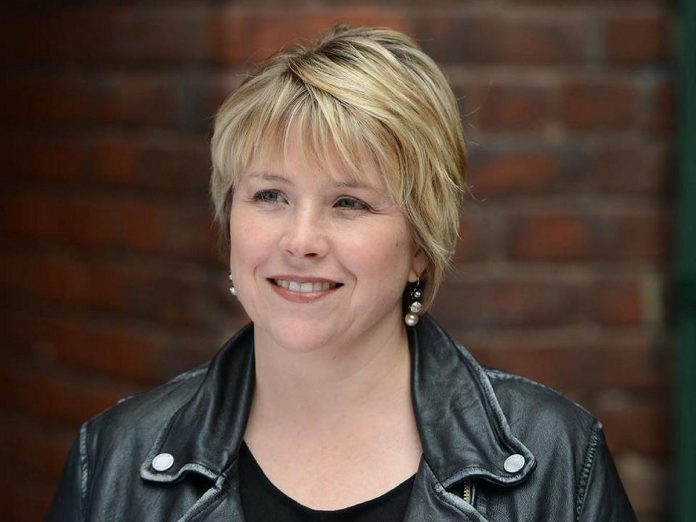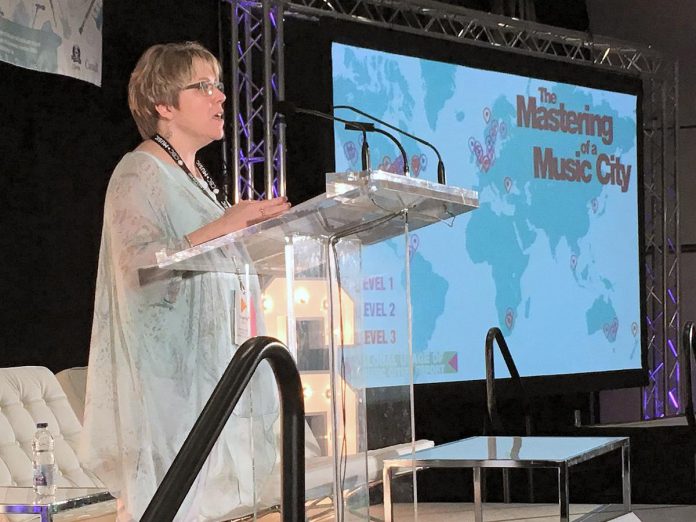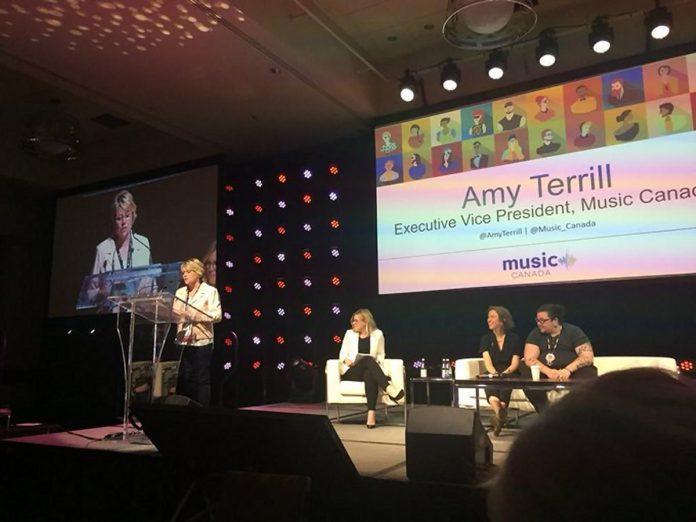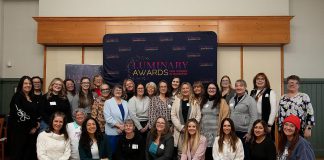
If there’s anyone you should be getting career — and life — advice from, it’s someone who has found success no matter what her position. With a diverse career where she has climbed into leadership roles seemingly without the traditionally required background or experience, BGC Kawarthas executive director Amy Terrill fits the bill.
A self-declared “hometown girl,” Terrill has spent her life in the Kawartha Lakes, even when she was making the commute to Toronto every day. Terrill began her vast career at Peterborough’s CHEX Television, spending nine years as a reporter, producer, and anchor.
She then made her first career pivot to focus on business support at the Lindsay and District Chamber of Commerce and the Ontario Chamber of Commerce. Another bend in the road came when she turned her long-time passion in the arts to a position with Music Canada, before she ultimately decided to channel her strengths locally, leading future leaders at the non-profit charitable organization BGC Kawarthas (Boys & Girls Clubs of Kawartha Lakes).
With such a wide range of experience, you can be certain Terrill has learned a thing or two along the way. Here are just a few lessons she shares from her own success story.
Don’t wait: Make the call.

Though her career began on television in the early 1990s, Terrill has never pursued an education in journalism or broadcasting. Always harbouring an interest in public affairs, she originally planned to pursue law while studying political science at Queen’s University.
It was while in school that Terrill became interested in journalism and, in the fall of her fourth year, she met broadcaster Wally Macht. She asked for advice on courses to study the craft, and when they parted ways, he told her to call her when she was done her degree. Instead, she took a chance and called him immediately.
“His instructions were that I was supposed to call after fourth year, but I was afraid he might have forgotten who I was by then,” she says. “I went to CHEX for an internship with no background in journalism. It became very clear on day one that they thought I was coming from journalism school.”
Though that first day of the internship would have been intimidating for anybody without journalism education, Terrill remembers being unfazed, adding that she was a “quick study” and able to pick up the job quickly.
“I don’t remember being terribly nervous,” she says. “I just remember having to be completely upfront. Everybody was very welcoming and very encouraging so maybe that’s what got me over those nerves.”
Choosing to make that phone call before finishing her schooling — she graduated from Queen’s with a BA in political science — or having any prior experience led to Terrill spending the next nine years at the station, working her way up from intern to reporter, anchor, and producer.
Identify your transferable skills.

When she left CHEX, Terrill says she “couldn’t see what was next” for her professionally. Only after connecting with a friend did she begin to outline for herself some of the transferable skills she was able to carry on throughout her career and the positions it took her.
“I was thinking ‘What do I do? I go out, I interview people, write stories, edit stories for television, deliver news from the anchor desk — but how are any of those things possibly relevant in another career?'” she says. “But you keep breaking it down further and further until you get to the basic tasks or basic skills that you are utilizing in order to be successful in that role.”
After leaving CHEX, Terrill worked for four years as general manager of the Lindsay and District Chamber of Commerce followed by another four years at the Ontario Chamber of Commerce as communications and media relations director and then vice president of communications and marketing.
She fought imposter syndrome when she began a new job at Music Canada in 2010, noting that “most people had been in the business their entire lives.” But, instead of focusing on the experience she didn’t have, Terrill reminded herself of what she did bring to the table.
“I was bringing valuable skills and experience — just from different industries — that I learned I could transfer into music to be very successful and bring a lot of value to the industry,” she says. “You just have to go back to those transferable skills.”
For anyone having difficulty finding those transferable skills, Terrill has one piece of advice: ask a friend like she did.
“Use your network. Be open-minded and don’t be afraid to ask people who know you well if they have ideas about other things that you could do.”
There’s more to the performing arts than performing.

As vice president of public affairs and then executive vice president of Toronto’s Music Canada, Terrill was instrumental in the non-profit’s marketing and communications while leading government relations at all levels, spearheading globally recognized research and strategies for music cities — which Music Canada describes as “a community of any size with a vibrant music economy” — and offering advice to communities internationally.
While her newfound success in the music trade industry might have seemed arbitrary given her professional background, it does line up with her personal interests. A singer from a young age, as a student at Lindsay Collegiate and Vocational Institute Terrill performed in many musicals and plays and was even an oboist in the Peterborough Symphony Orchestra.
Though she was discouraged from pursuing a career in music, she explains that her role at Music Canada showed her how much opportunity there is in the performing arts.
“So often as a young person, if you want to pursue performing arts, you’re identifying with the person on the stage or behind the microphone or the anchor on television,” she says. “Not everyone is going to necessarily become that front person, but there are so many different ways to contribute and be involved in careers in the performing arts.”
She lists the accountants, lawyers of copyright law, managers, agents, and publicists as some of the few who are all essential to the music industry.
Terrill recalls a time during one of those school productions when she was didn’t get the part she had hoped for. Instead, she begrudgingly took on the role of stage manager.
“It was one of my best experiences in theatre,” she says. “There are so many other roles — we all just fixate on the frontline performers.”
Now, this advice is something she is eager to share with the young people who access programming at BGC Kawarthas. When she first began as the organization’s executive director in 2019 after more than eight years with Music Canada, it was important to her to introduce more music programming.
“One of the objectives is to show teens in this area that there’s a lot more to music than what they may think,” she says. “Here, we can introduce them to sound engineering, song writing and instrumental, but we can also show them sound techs and what that might involve.”
Communication is key.

Of Terrill’s transferable skills, she acknowledges that communication is one of the “threads” that has weaved its way throughout her career from her early days at CHEX.
“It doesn’t matter whether you’re talking about professional relationships or leading a team or personal relationships, we all know how incredibly important communication is,” she says.
“You can have a great vision as the executive director or a leader in an organization, but if you can’t communicate that vision to the rest of your colleagues and your team, then you’re going to have trouble executing.”
Always understand your audience.

A key part to developing communication skills, adds Terrill, is understanding who it is you’re communicating with.
“No matter whether you’re in a job interview, speaking at an event, or in a one-on-one conversation, you have to understand your audience because if you don’t, your objective is likely going to misfire,” she says.
“I feel very fortunate to have had those experiences early on in my career (at CHEX) and then to be able to translate that into something valuable later no matter what role I was in.”
As with everything she has learned in her career, Terrill uses this advice in her work at BGC Kawarthas.
“A child and youth worker understanding what they might say in a topic to teens in our youth warehouse is entirely different from how they might address the same thing with our after-school kids,” she says as an example.
Terrill has a whole different audience in mind for her next professional pivot: publishing her debut novel.
The story of historical fiction is inspired by her great aunt’s experience working in a munitions factory in Toronto during World War I — right next to the building Terrill worked in at Music Canada.
As with many of her skills, writing is another of the transferable skills that have threaded their way throughout Terrill’s untraditional, though undoubtedly successful, career path.

























